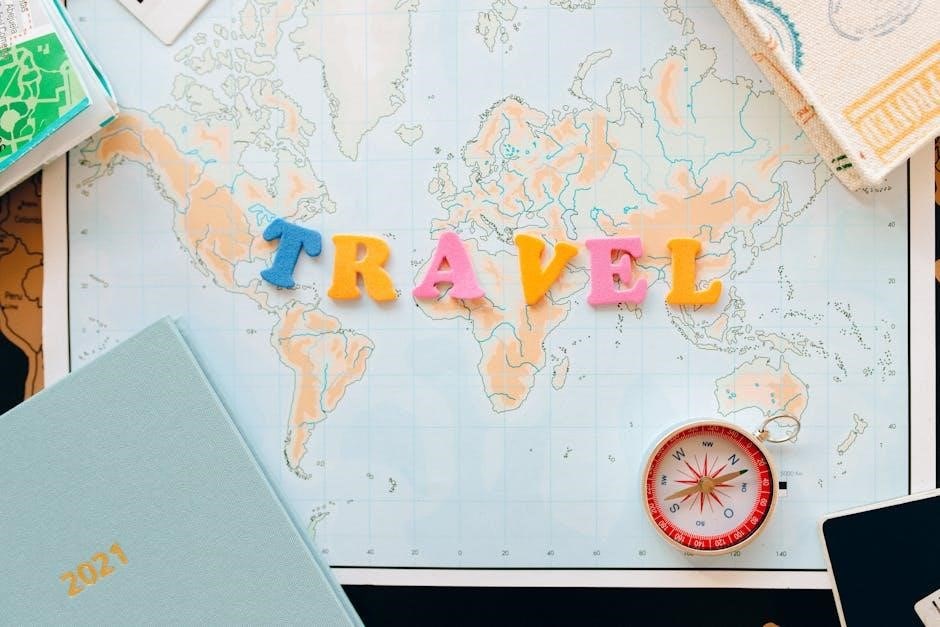Umrah, the sacred Islamic pilgrimage, is a minor Hajj and a highly rewarding act of worship․ It involves rituals like Ihram, Tawaf, and Sa’ee, performed in Makkah․
1․1․ Definition and Significance of Umrah
Umrah, often called the “lesser pilgrimage,” is a sacred Islamic ritual performed in Makkah․ It involves key acts like Ihram, Tawaf, and Sa’ee, reflecting deep spiritual devotion․ Unlike Hajj, Umrah can be undertaken at any time of the year and is not obligatory but highly recommended․ Its significance lies in its ability to strengthen faith, seek forgiveness, and attain spiritual rejuvenation․ Performing Umrah is a Sunnah of the Prophet Muhammad (peace be upon him) and is considered a means of drawing closer to Allah․ It embodies the essence of submission and humility, enriching the believer’s connection with their faith․

Preparations for Umrah
Preparations involve spiritual readiness, financial planning, and physical health․ Ensure halal earnings, resolve past religious duties, and make sincere intentions for a blessed journey․
2․1․ Spiritual and Financial Readiness
Spiritual preparation involves making a sincere intention to perform Umrah for Allah’s pleasure, repenting from past sins, and resolving to abstain from future wrongdoing․ Ensure financial readiness by using halal earnings exclusively for the journey․ It is essential to settle debts, fulfill family responsibilities, and make necessary arrangements for dependents․ Spiritual readiness also includes reciting the Quran, performing optional prayers, and seeking forgiveness․ Financially, plan for travel, accommodation, and expenses, avoiding unnecessary extravagance․ Lastly, make a will and consult a scholar for guidance to ensure a smooth and blessed pilgrimage․
Ihram: The First Step
Entering Ihram at Meeqat is the first step of Umrah․ It involves removing unwanted hair, trimming nails, performing Ghusl or Wudu, and donning Ihram garments, symbolizing purity and equality․
3․1․ How to Enter the State of Ihram
Entering the state of Ihram is the first ritual of Umrah․ Begin by repenting past sins and ensuring finances are halal․ Perform Ghusl or Wudu, trim nails, and remove unwanted hair․ Don Ihram garments, with men wearing two unstitched cloths․ Make the intention: “I intend to perform Umrah—O Allah, make it easy and accept it from me․” Recite the Talbiyah: “Labbaik, Allahumma Labbaik․” Women recite softly․ Avoid prohibited acts like arguing or hunting․ Maintain Ihram’s sanctity, ensuring purity of heart and deed throughout․
Tawaf: Circumambulating the Kaaba

Tawaf is a central Umrah ritual, involving seven circuits around the Kaaba․ Begin at the Black Stone, facing it, and recite specific supplications․ Maintain focus and sincerity․
4․1․ The Ritual of Tawaf and Its Etiquettes
Tawaf is performed by circling the Kaaba seven times counterclockwise․ Begin at the Black Stone, facing it, and recite specific supplications․ Men should uncover their right shoulder․ Avoid distractions, maintain modesty, and refrain from harmful actions like pushing․ Recite the Talbiyah and Quranic verses․ After completing seven circuits, perform two rak’ahs of prayer behind Maqam Ibrahim or elsewhere․ Ensure intention and sincerity throughout․ This ritual symbolizes unity and devotion to Allah, reflecting deep spiritual connection and submission․ Proper etiquette enhances the sanctity and acceptance of this sacred act․

Sa’ee: Walking Between Safa and Marwa
Sa’ee is a ritual where pilgrims walk between the hills of Safa and Marwa seven times․ It reflects Hagar’s search for water and embodies perseverance and faith․
5․1․ The Rituals and Significance of Sa’ee
The Sa’ee ritual involves walking seven times between the hills of Safa and Marwa, symbolizing Hagar’s search for water․ Pilgrims begin at Safa, reciting specific prayers, then proceed to Marwa, reflecting faith and perseverance․ Each lap represents a spiritual journey, emulating Hagar’s trust in Allah․ The ritual concludes at Marwa, where pilgrims offer gratitude and prayers․ Sa’ee signifies the universal quest for divine guidance and sustenance, embodying the essence of trust and submission to Allah’s will․ This act is a profound reminder of the blessings and trials faced by Hagar and Ishmael, making it a deeply spiritual and humbling experience for pilgrims․
Dhul-Hijjah and Umrah
Dhul-Hijjah is the sacred month for Hajj, and performing Umrah during this time holds great significance and reward, as emphasized in Islamic teachings and the Sunnah․
6․1․ Performing Umrah During Dhul-Hijjah
Performing Umrah during Dhul-Hijjah is highly recommended and considered a blessed act․ The Prophet Muhammad (peace be upon him) emphasized the virtues of worship in this sacred month․ Many Muslims opt to perform Umrah during these days to maximize their spiritual rewards․ The month is also a time for reflection and seeking forgiveness․ It is advisable to plan ahead, as Dhul-Hijjah attracts a large number of pilgrims․ Ensure all preparations, including Ihram and necessary documents, are completed beforehand to facilitate a smooth and fulfilling experience․ The spiritual atmosphere during this time enhances the overall Umrah experience, making it a memorable journey․
Supplications and Duas for Umrah
Essential duas and supplications accompany each step of Umrah, such as the Talbiyah and Tawaf prayers, ensuring spiritual focus and seeking Allah’s blessings throughout the pilgrimage․
7․1․ Essential Duas for Each Step of Umrah
Key supplications are integral to Umrah, starting with the Talbiyah upon entering Ihram: “Labbaik, Allahumma Labbaik․” During Tawaf, recite “Subhanallah” and “Allahu Akbar” at each corner․ After Tawaf, perform two rak’ahs with prayers like “Rabbana Aatina․” For Sa’ee, recite the dua at Safa and Marwa, seeking Allah’s mercy․ Conclude Umrah with the Halq or Qasr dua, expressing gratitude․ These supplications, rooted in Sunnah, enhance the spiritual experience and ensure divine acceptance of the pilgrimage․
Travel and Practical Tips
Pack essentials like a small backpack, dua book, prayer mat, and health items․ Stay hydrated, dress modestly, and keep documents handy․ Plan for comfortable travel and accommodations․
8․1․ Packing Essentials and Health Advice
Pack lightweight, modest clothing, sturdy shoes, and essentials like a prayer mat, Quran, and dua book․ Carry a small backpack for daily needs, including cash, ID, and medications․ Stay hydrated, bring sunscreen, and wear comfortable attire for extensive walking․ Consult a doctor for health clearance and vaccinations․ Ensure mental and physical rest before and during the trip․ Avoid overexertion and maintain a balanced diet․ Keep emergency contacts handy and stay informed about local health guidelines․ Prioritize personal hygiene and carry hand sanitizer․ Plan meticulously to ensure a smooth and spiritually fulfilling experience․

Concluding the Umrah
Upon completing Umrah, offer gratitude to Allah for His blessings․ Reflect on the spiritual journey, seek forgiveness, and return home with a renewed heart and faith․
9․1․ Final Rituals and Reflections
After completing Umrah, pilgrims perform a final Tawaf, expressing gratitude for the opportunity․ Reflecting on the journey, one seeks forgiveness and renewal․ The farewell Tawaf, if possible, marks the end․ This moment is a time for heartfelt supplications, thanking Allah for His blessings and guidance․ Pilgrims return home with a cleansed soul, renewed faith, and a deeper connection to their spirituality․ The conclusion of Umrah is a poignant reminder of the divine mercy and the transformative power of worship․
